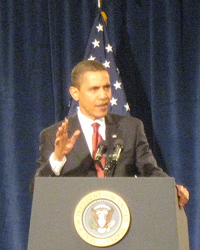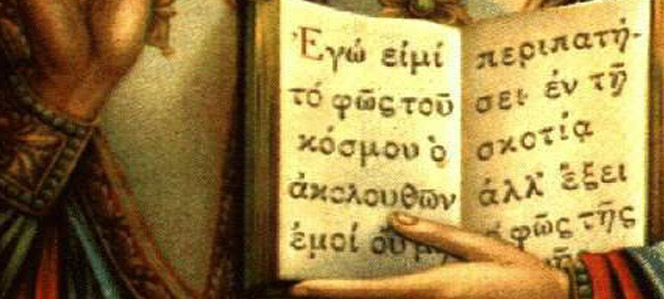By Rev. Robert Barron
 What is it about Catholic universities and our current president? As everyone knows by now, Notre Dame, the flagship Catholic university in the United States is presenting an honorary degree (in law of all things) to the most radically pro-abortion president in history. And now we learn that Georgetown, the most prominent Jesuit university in the country, in order to satisfy the demands of the Obama White House, covered up all the religious symbols in its Gaston Hall when the President spoke there recently. Most egregiously, they placed black-painted wood over the golden letters IHS which were inconveniently situated directly over the president’s lectern. These are the first three letters of the name of Jesus in Greek, IHSOUS, which were adopted five centuries ago by St. Ignatius of Loyola as a special emblem of his order, the Society of Jesus. The White House evidently wanted a background of flags and drapery for the president’s policy speech and resolved that the IHS and other religious signage should be obscured.
What is it about Catholic universities and our current president? As everyone knows by now, Notre Dame, the flagship Catholic university in the United States is presenting an honorary degree (in law of all things) to the most radically pro-abortion president in history. And now we learn that Georgetown, the most prominent Jesuit university in the country, in order to satisfy the demands of the Obama White House, covered up all the religious symbols in its Gaston Hall when the President spoke there recently. Most egregiously, they placed black-painted wood over the golden letters IHS which were inconveniently situated directly over the president’s lectern. These are the first three letters of the name of Jesus in Greek, IHSOUS, which were adopted five centuries ago by St. Ignatius of Loyola as a special emblem of his order, the Society of Jesus. The White House evidently wanted a background of flags and drapery for the president’s policy speech and resolved that the IHS and other religious signage should be obscured.
Now the question of the right relationship between religion and politics in our society is a famously complex one, and I certainly don’t blame Georgetown for inviting the president to give a policy address at its campus. When I was critical of Notre Dame’s decision to present Obama with an honorary degree, some people accused me of wanting to close down the conversation and turn Catholic campuses into intellectual ghettos. I responded that I would have had no objection to the president coming to Notre Dame to debate, to argue, to discuss—even the matter of abortion. What I objected to was the honor that they were giving him. So there isn’t the slightest problem with Georgetown offering itself as a forum for a serious presidential speech. But what a Catholic university should never do is to surrender its own identity or to make apologies for its own deepest commitments. A Catholic center of higher learning should never acquiesce in its own secularization in order to participate in the public conversation. I must confess that I found Jesuit Fr. Thomas Reese’s comment hard to take. Attempting to explain the situation, he said that Georgetown agreed with the White House that there shouldn’t be anything to distract the attention of the audience from the President’s words. So a priest of the Society of Jesus thinks that, at a Jesuit university, the name of Jesus is a distraction!
In point of fact, understanding Jesus is the key to this particular controversy and to the wider question of the church and the public square. The peculiar claim of the church is that Jesus is not one religious figure among many, not one more in a long line of prophets and inspired teachers. Jesus is the Son of God, the incarnation of the Logos, which is to say, the very word by which God created the universe. The great theologians of our tradition clearly grasped the implication of this doctrine: Jesus, precisely as the Logos made flesh, is related to any and every expression of logos (mind or reason) in the culture. Every truth discovered by science or philosophy, every design apparent in nature, every instance of artistic beauty, every arrangement of justice is a reflection of what appears fully in Jesus. And this is why the church, at its best, has always been the friend of the arts, of philosophy, of science, and literature.
And this is furthermore why the first universities—Bologna, Paris, Oxford, Cambridge—emerged precisely out of the milieu of the church. In the thirteenth century, St. Bonaventure, professor at the University of Paris, composed an extraordinary text called Christ the Center, the gravamen of whose argument is that Jesus the Logos is at the heart of physics, mathematics, history, and metaphysics. In the mid-nineteenth century, John Henry Newman, in a series of lectures entitled The Idea of a University made much the same assertion. The Jesus reverenced by the great tradition belongs therefore very much in the public sphere and around the table of intellectual conversation. In that context, he poses no threat to legitimate expressions of reason and he serves as a trump to the unreason that can surface easily enough in the sciences, in politics, or in philosophy. A Catholic university worthy of the name is a place where Jesus the Logos has this essential regulating role.
What is particularly interesting (and troubling) about the Georgetown decision to cover up the name of Jesus is that it symbolizes something much broader, viz. the tendency of too many Catholic institutions to consider Jesus something of an embarrassment, a hindrance to the full immersion of Catholics in the secular society. The Christ who is the embodiment of Reason itself does not hinder, and should never embarrass, those who are seeking truth in any form.
